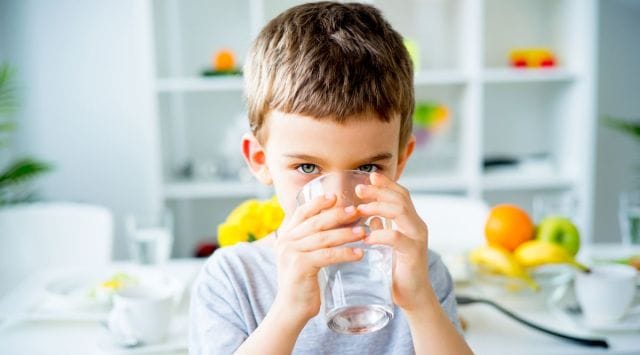How to keep children hydrated during winters
We may think children need to drink more water in summer than in winter, but dehydration is not just a summer problem
 When you are with your child, keep water handy and offer it frequently, either every couple of hours or more frequently when the air is particularly hot in the summer or dry in the winter. (Image Source: Canva)
When you are with your child, keep water handy and offer it frequently, either every couple of hours or more frequently when the air is particularly hot in the summer or dry in the winter. (Image Source: Canva) Dr Parvinder Singh Narang
We always assume that dehydration only occurs in the heat and summers, along with health complications like loose motions and vomiting. Since heat and sweat are gone in the winter, it makes sense to assume that your child doesn’t need as much water as he or she did in the summer. However, for the overall health, children still need to drink plenty of water throughout winters as well. For parents and childcare workers, knowing the signs of dehydration is important.
It is fairly common for children to get dehydrated. When a child is busy, drinking water is not the first thing on their mind. Children may not realise they are thirsty until they are nearly dehydrated, if they do not have access to a beverage. Therefore, when you are with your child, keep water handy and offer it frequently, either every couple of hours or more frequently when the air is particularly hot in the summer or dry in the winter.
Signs of dehydration include:
* sunken eyes
* loss of skin turgor
* reduced urine output
* cold peripheries
* your child plays less and seems less interested
* the baby’s head has a sunken soft spot.
They typically do not exhibit loss of skin turgor in the winter, and since the edges of their bodies are already cold, parents are unable to recognise the signs of dehydration.
The main reason for dehydration in winter is a change in fluid/water consumption. They consume less water, but our bodies still require a lot of fluids for digestion, breathing, and circulation. The first step in providing adequate hydration is knowing how much fluid is needed:
* Four cups of liquid plus 1.5 cups of food for children aged 1-3
* Five cups of liquid plus two cups from food for children aged 9-13
* Eight cups of liquid plus 2.5 cups from food for those above
In the winter, children wear too many layers of clothing, which causes a lot of fluid loss through sweating and insensible losses caused by metabolism in the body due to breathing and digestion. They may become severely dehydrated as a result. This is another factor causing dehydration in children in winter. To address this, again the body needs additional liquids.
Winter dehydration differs from summer dehydration and unlike excessive thirst in summer it causes:
* headaches
* nausea
* irritability
Nausea and headaches further reduce fluid intake and exacerbate dehydration. Dehydration also affects memory, sleep, and cognitive function, affecting academic performance. As a result, we should encourage children to drink more water even in the winter and monitor their urine output. Dehydration also affects children’s cognitive functioning and sleep, making them more irritable. To avoid dehydration in the winter, ensure that children drink enough liquids and produce enough urine.
One major factor is that no one likes to consume more water in the winter which leads to severe dehydration. To prevent this, we should:
*Keep giving them extra liquids like fresh juice, coconut water, and fresh fruits. This way, you not only keep your kids hydrated, but you also make sure they get their water at every meal, which is especially important in the winter when kids often don’t feel thirsty and forget to drink water! Juices made with apples, oranges, pineapple, carrots, beetroot, and other fruits will nourish your child and strengthen their immune system.
*Serve drinks at room temperature because it keeps the body at a constant temperature. Compared to cold drinks, which force the body to work harder to adjust, this will cause us to lose heat faster rather than keep it for warmth. Warm liquids like soup and hot milk can also help them stay hydrated and avoid dehydration in the winter.
*Eat green leafy vegetables, milk, oranges, strawberries, lychees, oatmeal, cantaloupe, celery, yogurt, and other water-rich foods every day to get more water into your system. Also, try to cut back on fried and processed foods like cake, pasta, pastries, white bread, chips, and pizza because they make your body lose water and make you thirsty afterward.
*Let children play outside in winter, but in layers. On a cold winter day, it might seem safer to keep the kids inside, but playing all day in a heated house can dry everyone out. Instead, let your kids play outside in the sun and let the moisture from the cold air naturally get into their bodies. As long as your children are dressed warmly and in layers, crisp, cold air can be refreshing for their health.
Winter is a time for having fun. It is up to us to teach our children about providing their bodies with the appropriate nutrients and hydration necessary to fight off winter viruses and infections, just as your car needs more fuel to stay energised on the road. Therefore, don’t hesitate to boost your family’s vitality during the winter months when the cold sets in: by drinking water slowly, effectively, and thoroughly.
Dr Parvinder Singh Narang is head of department, Pediatrics Max Super Specialty, Shalimar Bagh
For all the latest Parenting News, download Indian Express App.



- 0119 hours ago
- 0218 hours ago
- 0319 hours ago
- 0419 hours ago
- 0519 hours ago




























